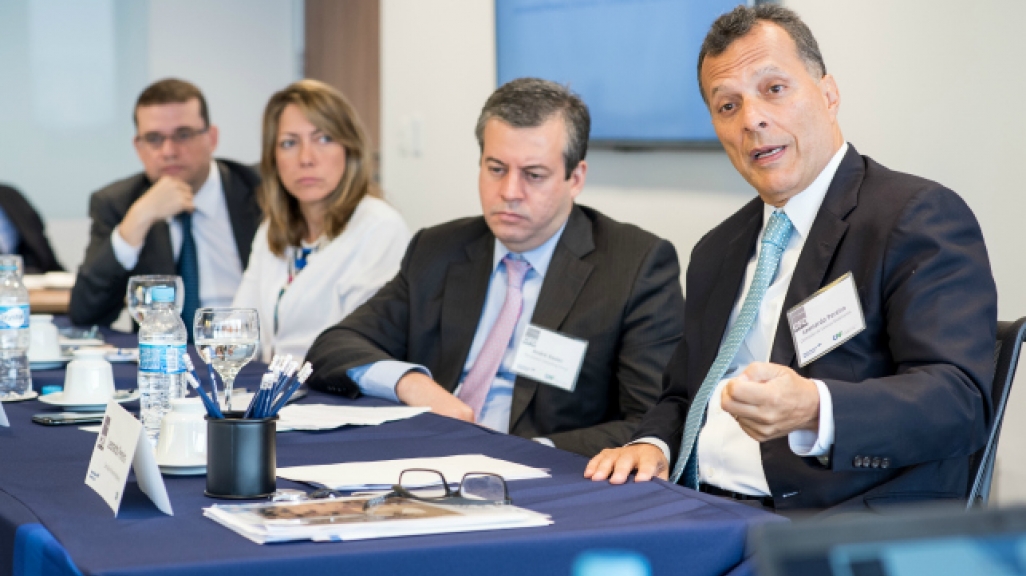Summary: CFO Forum in Rio de Janeiro
Summary: CFO Forum in Rio de Janeiro
In the face of political uncertainty, recession, and a global economic slowdown, Brazil has “hit a wall,” said a speaker at COA’s CFO Forum in Rio de Janeiro.
The ability to identify risks and maintain financial stability is especially important for CFOs now that Brazil is struggling with the worst recession since the 1930s. So said Leonardo Gomes Pereira, chairman of Brazil’s Securities Regulator (CVM), at the CFO Forum organized by the Council of the Americas on April 8, in Rio de Janeiro.
"The CFO is the setter in a volleyball match, preparing the ball for the CEO to attack," Pereira said. "The court is usually made of sand, but sometimes it’s quicksand, or a glacier, constantly moving beneath our feet."
Risks are changing along with the business environment. Social media and the speed at which information is disseminated directly affect how business is done. For public companies, for instance, it’s a bigger challenge now to define what should be considered a material fact, and how relevant information should be broadcast.
Some other conditions, such as volatility in foreign exchange and credit markets, pose an even greater risk.
Currency price risks can be mitigated by hedging instruments, but credit risk is harder to determine and difficult to hedge. To make matters worse, small- and medium-sized companies that are not regulated by CVM often resort to creative accounting practices that blur the true financial picture in their balance sheets. CVM is working to reduce gray areas and gaps in regulation but there is still a lot of work to be done, Pereira said.
Economic outlook
Brazil is facing an unprecedented combination of two consecutive years of recession, high interest rates, and a primary deficit, said David Beker, chief Brazil economist at Bank of America Merrill Lynch. A weak real is here to stay, and Beker considers it is fairly valued at BRL 3.80 per U.S. dollar.
With the global economy growing at a slower pace than forecast, there won’t be many external drivers to prop up Brazil’s economy. Beker sees global growth at 3.2 percent in 2016 and 3.6 percent in 2017. Even the U.S. economy, which 18 months ago was expected to grow at 3.5 percent in 2016, will grow less than 2 percent.
There is limited room for government stimulus everywhere; growth in China is slowing to about 6.6 percent this year, and the growth model is shifting away from an investment model to a more domestic-consumption and services-led economy.
In Brazil, the political crisis creates uncertainty in the short term as it paralyzes investment decisions. A government with Vice President Michel Temer at the helm is positive on paper, but much of Brazil’s economic disaster and pain will still hit, regardless of politics. GDP will fall at least 3.5 percent and unemployment will move from about 9 percent to 12 percent by the end of the year, according to Beker.
The country “hit a wall,” and the next round of bad news will come from credit markets, said Beker. Delinquency rates are still relatively stable but corporate and consumer debt levels are very high. Small companies are struggling and soon we will start to see large companies in trouble.
Consumption, which represents 65 percent of Brazil’s GDP, is slowing fast. Potential GDP now stands at just 1.5 percent, and that’s if Brazil manages to control spending and implement some fiscal reforms. "But for that to happen we need to move away from consumption and more to an economy supported by investment and the external sector,’’ Beker said.
Investment has been negatively affected by political uncertainty and the ongoing investigation into a massive bribery scheme involving state oil firm Petrobras, politicians, and construction companies.
But the medium- and long-term views look brighter. Slower growth will reduce inflation, allowing the Central Bank to trigger an easing cycle that may take the benchmark Selic rate from 14.25 percent to 10 percent by 2017, Beker estimated.
The bigger risk for Brazil’s government would be to postpone fiscal reform and embark on a populist spending spree that may lead to hyperinflation. Brazil’s social security system is already on an explosive path: the deficit of $24 billion (BRL 86 billion) in 2015 is expected to jump to $25 billion (BRL 125 billion) this year. But—with 35 parties represented in Congress, compared with 17 in Chile and about eight or nine in the case of most other Latin American countries—it’s extremely hard to make reforms happen in Brazil.
Photo, left to right: Annali Duarte (Bank of America Merrill Lynch), André Xavier (The Boston Consulting Group), and Leonardo Pereira (Comissão de Valores Mobiliários).
This summary was prepared by Latin Trade.








